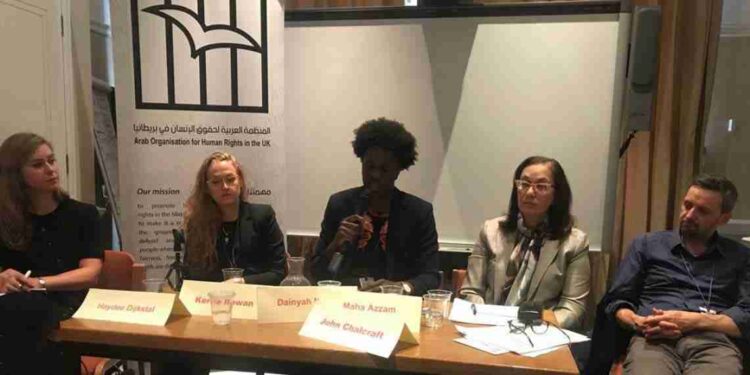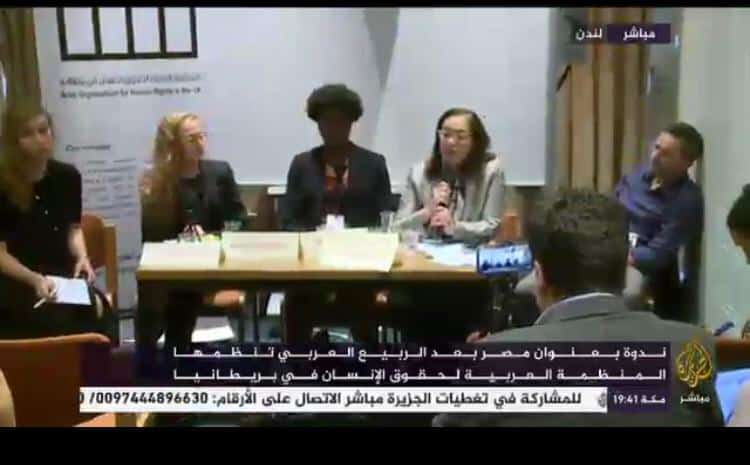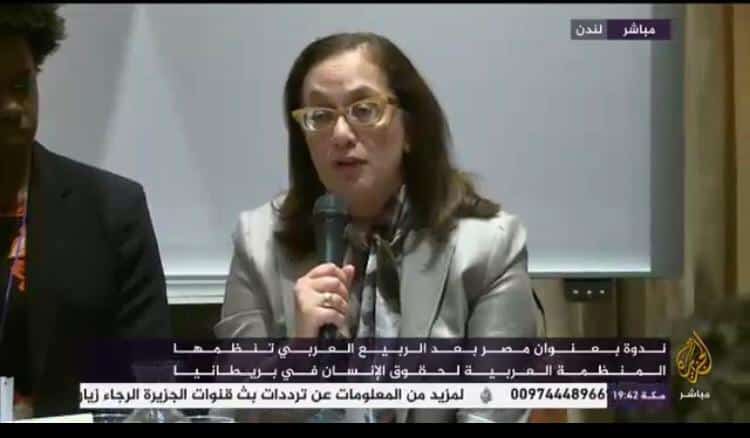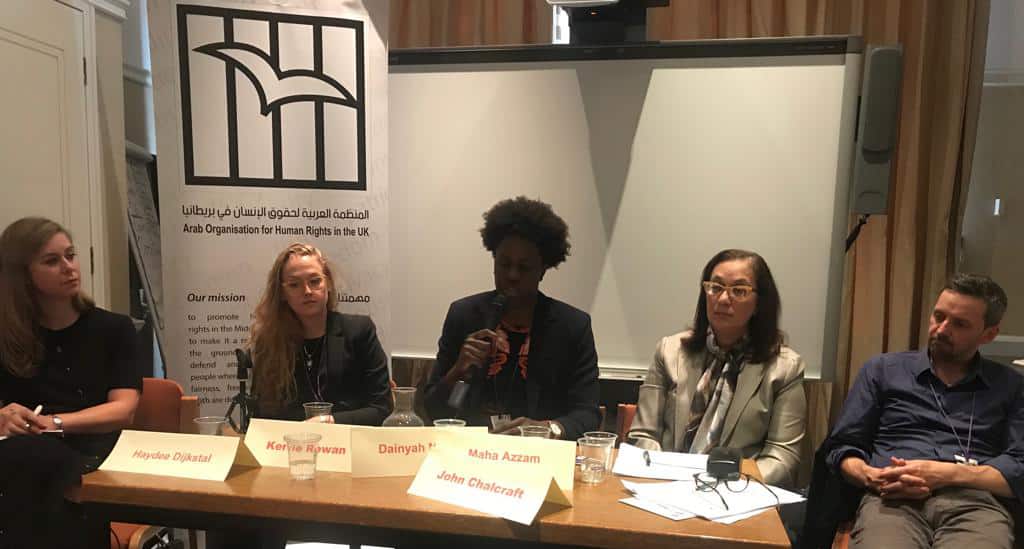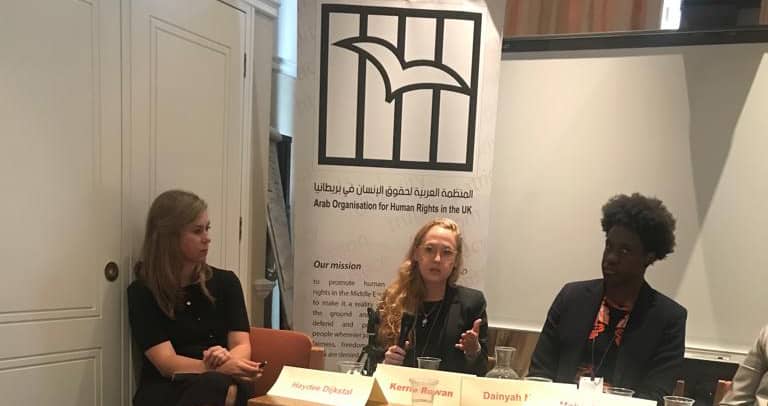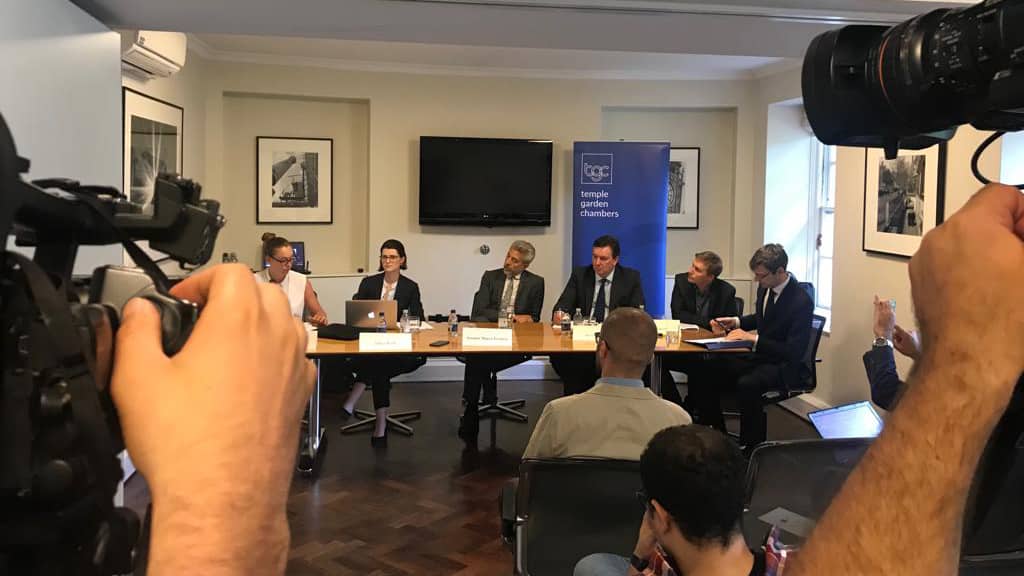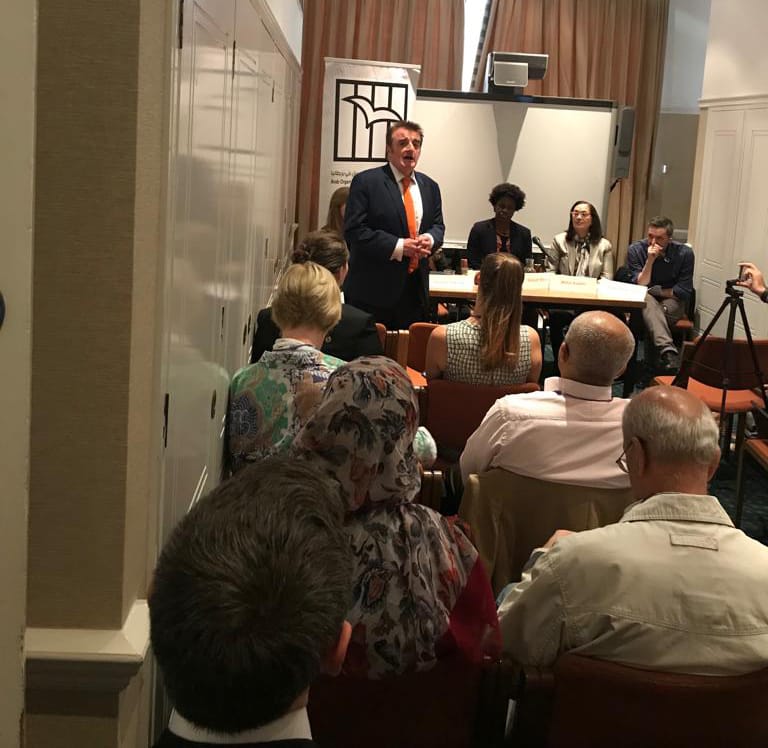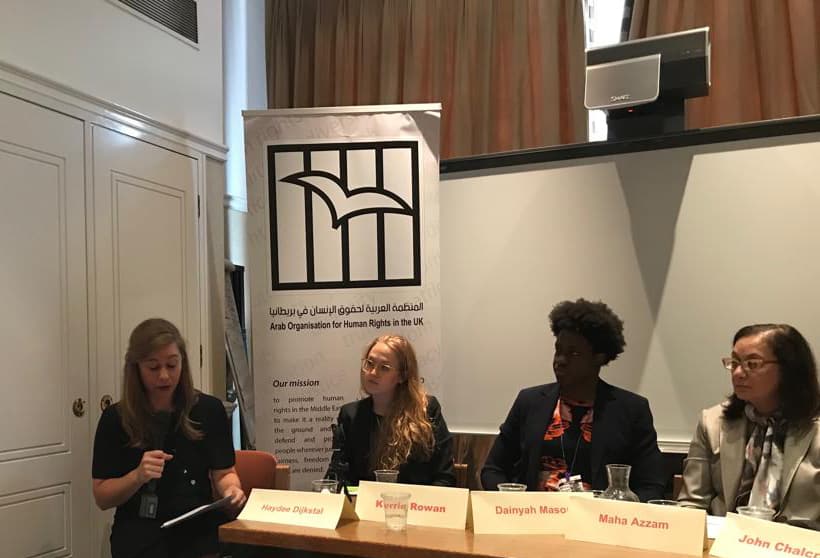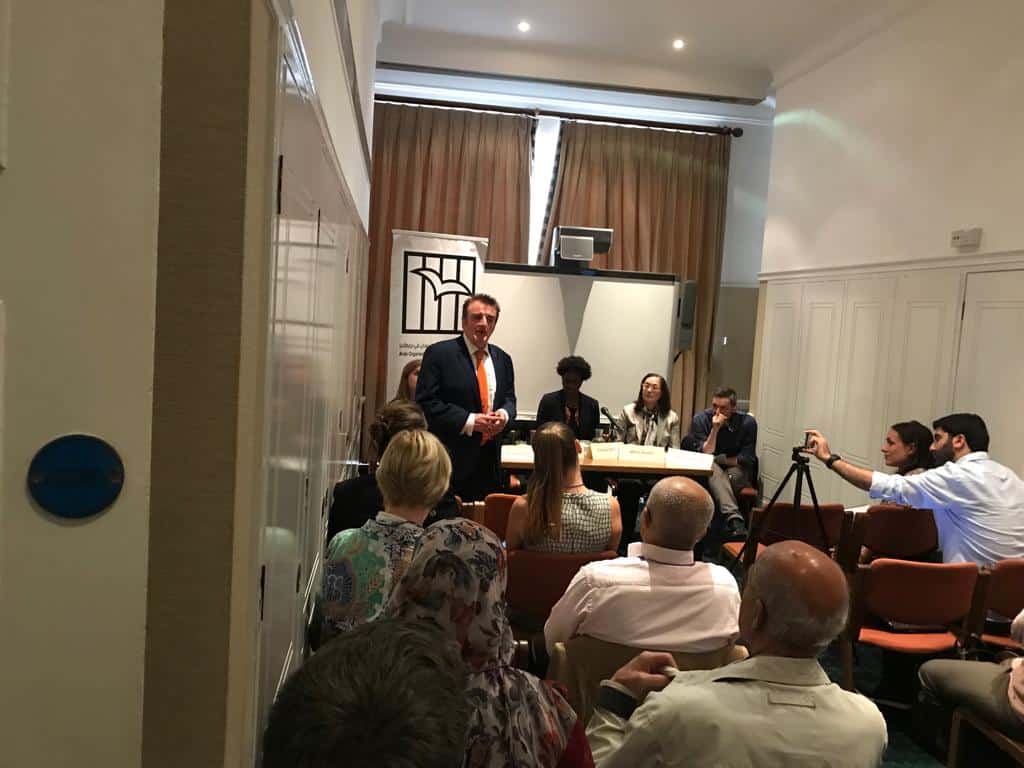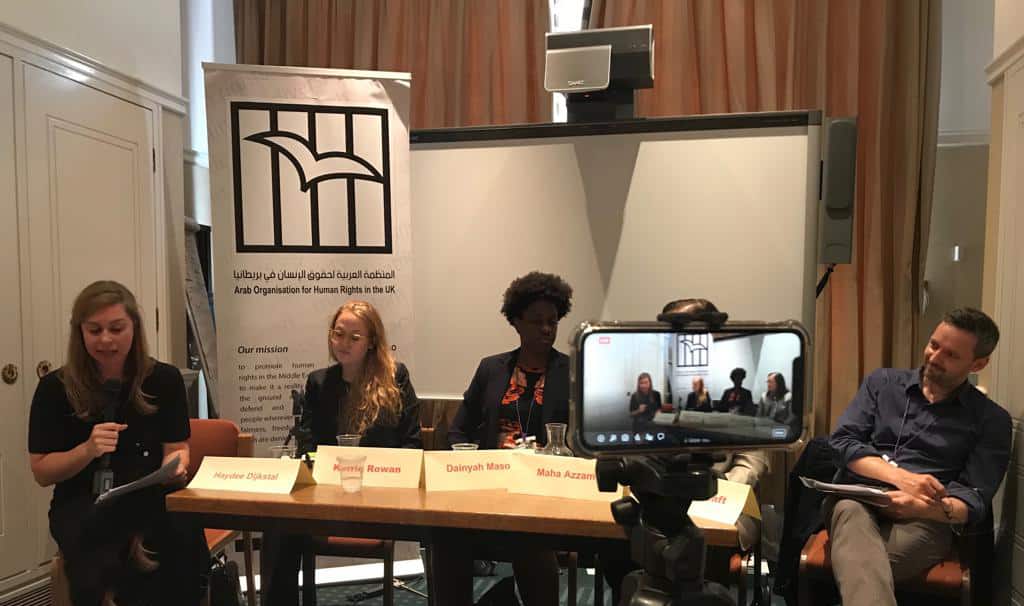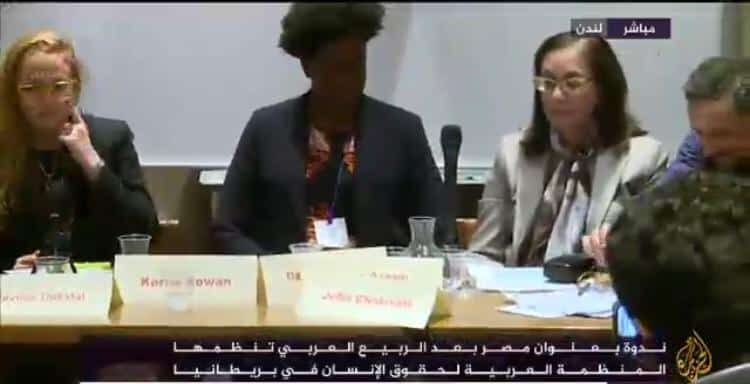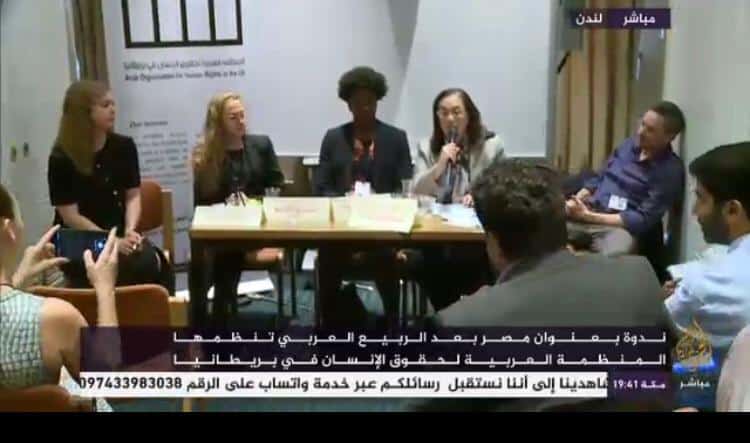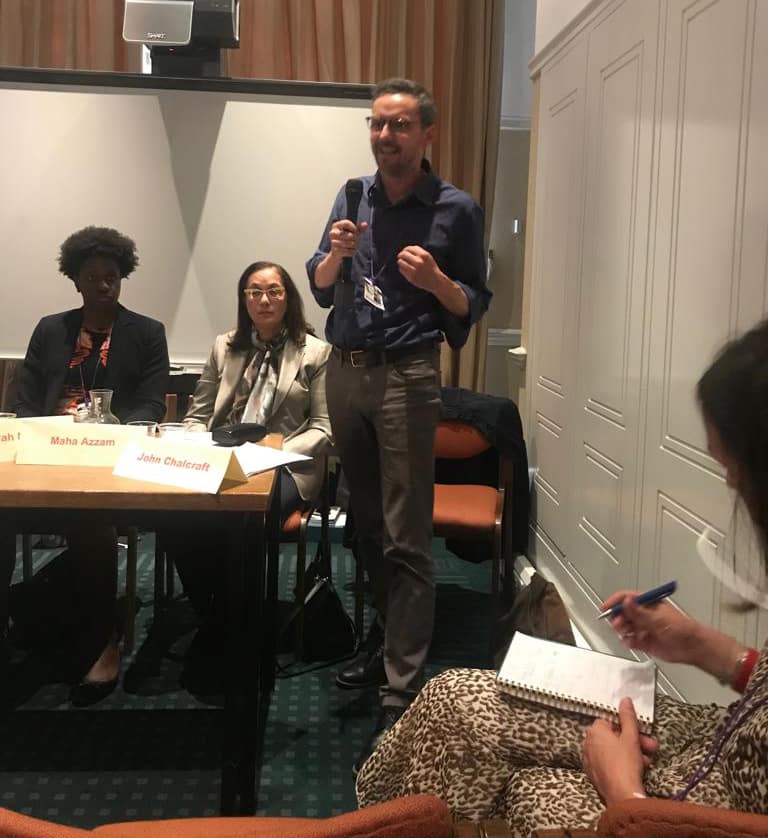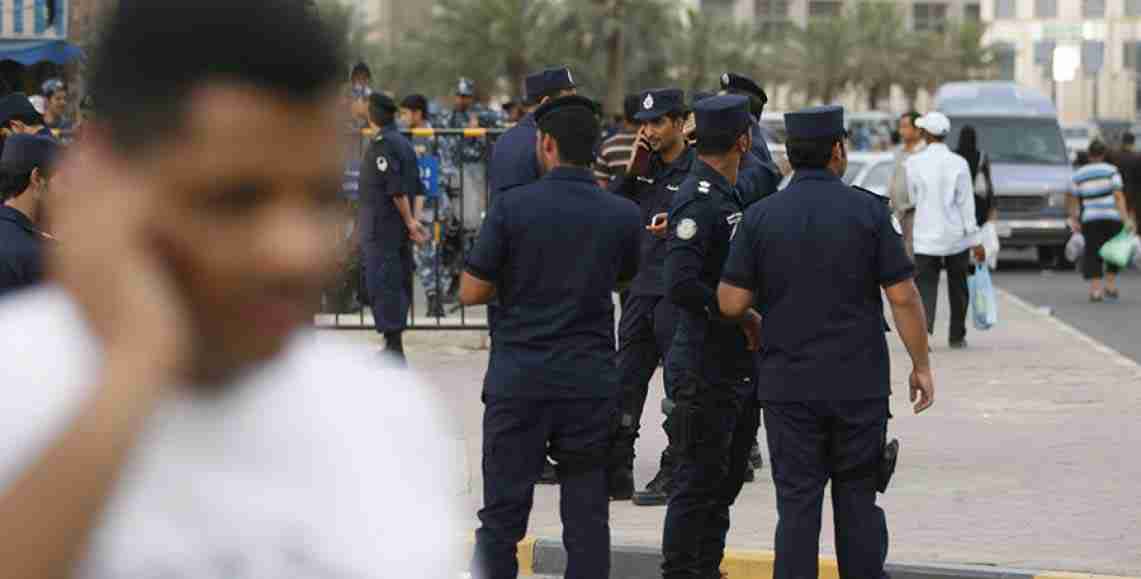On 10 July 2019 at House of Commons, an event hosted by Tommy Sheppard MP brought together a panel of leading human rights experts and lawyers to review the situation in Egypt six years on from the military coup in July 2013 that toppled the first democratically elected government in the country.
The panel included 1) Professor John Chalcroft, Professor of Middle East History and Politics, London School of Economics (LSE); 2) Dr Maha Azzam, Leading Policy Expert on Egypt, former Associate Fellow Chatham House (Middle East and North Africa Programme); 3) Dainyah Mason, International Bar Association (IBA), International Criminal Court (ICC); 4) Kerrie Ann Rowan, Barrister, 25 Bedford Row Chambers and 5) Haydee Dijkstal, Barrister, 33 Bedford Row Chamber. The event was sponsored by the Arab Organisation for Human Rights in the UK (AOHR). It was highlighted that:
- The human rights situation in Egypt has reached rock bottom over the past six years and is only getting even worse with a total clampdown on all freedoms and all opposition.
- Western governments continue to give full support to El-Sisi’s military regime, and take no meaningful steps to condemn the widespread human rights abuses and bring them to an end, which further exacerbates the crisis.
- It is vital now that the international community take action to halt the killings, executions, torture, detentions, unfair trials and repression of all human rights and investigate and prosecute those responsible including for the death in custody of the first democratically elected president of Egypt, Dr Mohamed Morsi.
The panel addressed the several credible reports of mass human rights violations and international crimes committed since the military coup in July 2013 that brought General Abdel Fattah el-Sisi to power; including widespread arbitrary detentions, mass death sentences and executions, gross violations to fair trial rights, extrajudicial killings, torture and severe restrictions on freedom of the press and to free expression. It is reported that in this time at least 3,185 people have been killed in Egypt by government authorities and forces (excluding those killed in the Sinai region), of which 2,194 were killed in peaceful protests and gatherings, and 766 were killed while in detention (516 of which died as a result of a lack of medical treatment). Politicised executions following manifestly unfair trials have accounted for the lives of 45 Egyptians while 83 detainees are on death row. In the Sinai region alone it is reported that over 4400 persons have been killed. In addition, over 60,000 persons languish in detention in Egypt on ‘political’ and related grounds, many without charge, or facing trumped up, unsubstantiated allegations. All opposition groupings are effectively silenced. The crackdown has been overwhelming and is only getting worse.
The panel also examined the recent death of Egypt’s first democratically elected head of state, former President Mohamed Morsi, and expressed grave concerns about the ways in which his appalling conditions of detention and treatment in prison over many years had contributed to his death in custody.
It was stressed that all potential avenues for accountability and justice must be pursued for those affected in Egypt. In particular, it was essential to initiate an immediate investigation into the grave human rights violations suffered by Dr Morsi during the entire period of his 6 years in detention, and to seek accountability for all victims of human rights violations and international crimes in Egypt by way of international, regional and domestic mechanisms. The deafening silence of many key Western governments was viewed as a major contributing factor to the continuing pattern of widespread and systematic abuses.
The panel of experts and lawyers thus called for urgent actions to be taken, in particular:
- The establishment of an independent and impartial UN investigation to examine the causes of President Morsi’s death, to make findings on the human rights violations he suffered, and to determine the manner in which his conditions of detention and mistreatment contributed to his death in custody;
- The condemnation by the international community, including the UK Government, of the gross human rights violations committed by General El-Sisi’s government, and the demand for all prisoners arbitrarily detained to be released and for the effective investigation and prosecution of the perpetrators, failing which diplomatic and economic sanctions should be imposed on the Egyptian government to end the continuing mass abuses;
- The imposition of an immediate moratorium on the death penalty by the Egyptian authorities so that no further executions take place; and
- The immediate lifting of all restrictions on the press and media (including in respect of social media), and that journalists are protected and freedom of expression and assembly are fully restored.
Haydee Dijkstal, a Barrister at 33 Bedford Row Chambers practicing international criminal and human rights law, introduced the panel and the issues for discussion. She outlined the importance of drawing attention to these violations and crimes, and of demanding accountability. She stated that “For too long, the Egyptian authorities under the leadership of General El-Sisi, have perpetrated gross and consistent human rights violations with impunity. The international community has failed to step up to demand answers and ensure steps are taken to provide justice for victims and hold those responsible to account. International human rights law guarantees all victims and their families the right to know the truth and the right to a remedy. Independent and impartial investigations must be initiated and prosecutions pursued without further delay, and the international community must re-evaluate its relationship with the Egyptian authorities until these violations are stopped and remedied.”
Dr Maha Azzam, a leading Policy Expert on Egypt and former Associate Fellow for the Middle East and North Africa Programme of Chatham House, said:
“The coup of July 3rd 2013 overturned Egypt’s nascent democracy and ushered in a dictatorial reign of terror against political dissidents. The regime’s systematic use of torture and killing has resulted in the death of the country’s only democratically elected President, Dr Mohammed Morsi. The violations continue to escalate as 60,000 political prisoners face a similar fate to that of the late President. The world has remained silent for too long and that silence has empowered Egypt’s military regime and granted it a licence to kill it’s own people.”
Dainyah Mason, of the International Bar Association and International Criminal Court, examined potential methods of accountability for victims through international law and UN mechanisms. She highlighted that: “The language of ‘counter-terrorism’ has been used to silence government opponents through the law and media and the international community needs to make it clear that no one is buying it.”
Professor John Chalcroft of the London School of Economics, emphasised that: “As Egypt descends ever further into dictatorship and socioeconomic crisis, Western governments continue to give full support to Al-Sisi’s military regime. In Western security and policy establishments, the usual caricatures about stability and terrorism prevail. Democracy and human rights are set to one side; and social justice isn’t even on the agenda. This history is familiar and its dire consequences are predictable.”
Kerrie Ann Rowan, a Barrister at 25 Bedford Row Chambers practicing criminal and international law, addressed holding perpetrators responsible before jurisdiction exercising universal jurisdiction. She stated that “There are methods of holding perpetrators of international crimes – such as torture, war crimes or crimes against humanity – accountable in the UK under universal jurisdiction. Although there are some challenges to overcome, there are also examples that show universal jurisdiction has the potential to offer victims an avenue to approach the UK Metropolitan Police or convene a private prosecution under universal jurisdiction to put pressure on the Egyptian authorities to account for the crimes committed.”



















